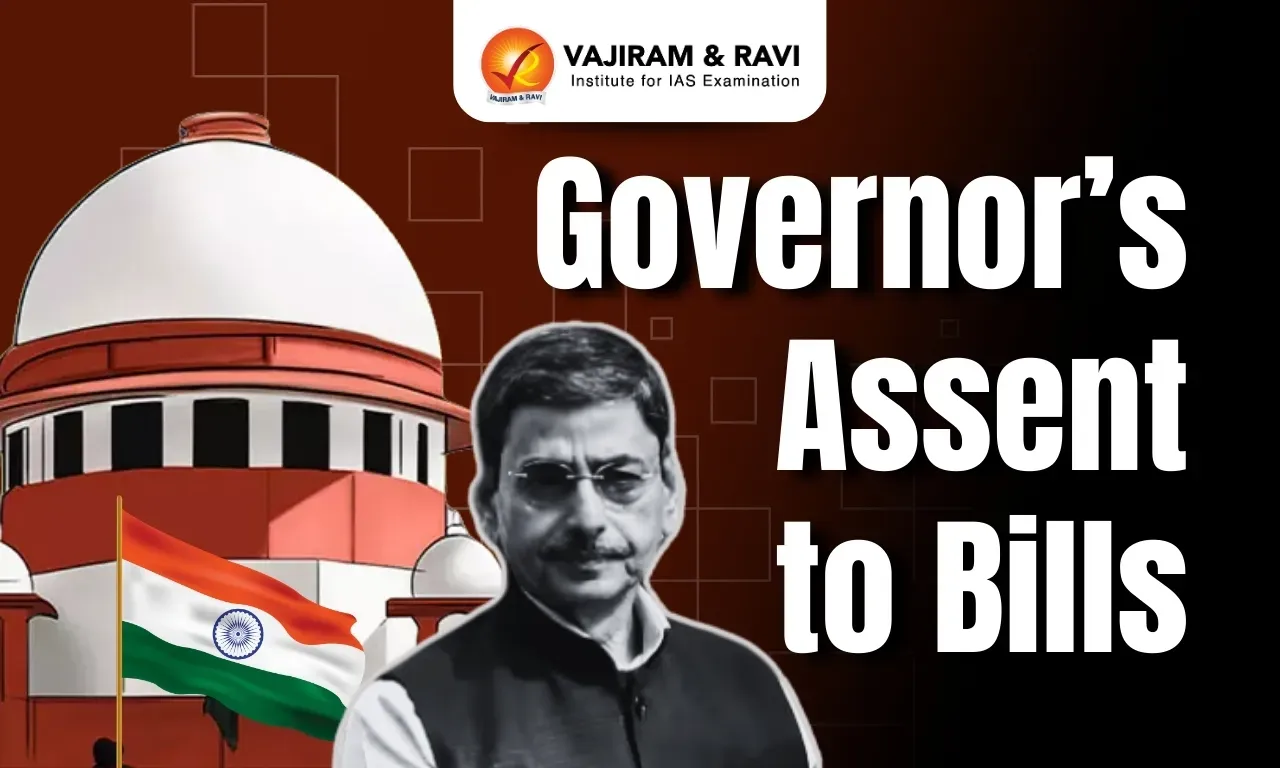Governor’s Assent to Bills Latest News
Supreme Court Fixes Timeline for Governor’s Action on State Bills
Background
- The Supreme Court of India in a landmark verdict reprimanded Tamil Nadu Governor R.N. Ravi for withholding assent or delaying action on 10 state bills, which were re-presented by the state legislature.
- The Governor had reserved these bills for the President’s consideration, which the Court held as unconstitutional.
Case Context
- In 2023, the Tamil Nadu government approached SC, citing deliberate delay by the Governor.
- 12 bills (including one from 2020) were pending assent.
- On Nov 13, 2023, the Governor withhold assent to 10 bills.
- The Assembly re-enacted these bills on Nov 18, 2023.
- The Governor again reserved some bills for the President on Nov 28, 2023.
Key Constitutional Provisions Involved
- Article 200: Deals with the powers of the Governor regarding bills passed by the State Legislature. The Governor can:
- Give assent
- Withhold assent
- Reserve the bill for the President’s consideration
- Article 201 – President’s veto power on bills reserved by the Governor.
- Article 142 – Supreme Court’s plenary power to ensure complete justice.
Supreme Court’s Major Observations
- The Governor’s action of reserving 10 bills for the President was declared illegal and arbitrary.
- Bills re-presented to the Governor shall be deemed to have received assent from the date of re-presentation.
- The Governor does not have discretion under Article 200 and must act on the aid and advice of the Council of Ministers.
- The Governor cannot exercise an “absolute veto” or “pocket veto” by sitting indefinitely on bills.
- Delays in granting assent cripple the legislative process and are against the spirit of federalism and democracy.
Timelines Fixed by the Supreme Court (First Time Ever)
|
Scenario |
Maximum Time Allowed |
|
Withhold Assent or Reserve for President (with aid & advice of CoM) |
1 Month |
|
Withhold Assent without CoM’s advice |
Must return the bill within 3 Months |
|
Bill Re-passed by Assembly (2nd time) |
Governor must give assent within 1 Month |
Judicial Oversight Introduced
- If these timelines are not followed, the Governor’s inaction becomes subject to Judicial Review.
- The Supreme Court invoked Article 142 to declare the bills as deemed to have received assent.
Reaffirmation of Democratic Principles
- The Governor cannot act as an obstructionist.
- Elected legislators, being representatives of the people, are best placed to enact laws.
- The Governor must act as a “friend, philosopher and guide”, not as a political actor.
- The Governor must facilitate governance, not paralyze it.
Clarification on Reserve Power (Article 200)
- Once a bill is re-passed by the Assembly, the Governor cannot reserve it again unless the content has materially changed.
- Any attempt to delay action violates the Governor’s constitutional oath.
Governor’s Assent to Bills FAQs
Q1. What constitutional provisions govern the Governor’s assent to state bills?
Ans. Under Article 200, the Governor can assent, withhold assent, or reserve a bill for the President’s consideration. They may also return non-money bills for reconsideration by the state legislature.
Q2. Why is delayed assent by Governors controversial?
Ans. Prolonged delays (e.g., Tamil Nadu’s 2023 bills pending for 6+ months) undermine legislative autonomy, sparking judicial scrutiny (Supreme Court’s 2023 Punjab vs. Governor case).
Q3. Can courts intervene in assent-related disputes?
Ans. Yes. In Nabam Rebia (2016), the SC ruled that Governors must act on cabinet advice, barring exceptional cases like constitutional violations.
Q4. What happens if a bill is reserved for the President?
Ans. The President may assent, withhold assent (Article 201), or direct the Governor to return it to the assembly (e.g., Kerala’s University Laws Amendment Bill, 2022).
Source: HT
Last updated on June, 2025
→ UPSC Notification 2025 was released on 22nd January 2025.
→ UPSC Prelims Result 2025 is out now for the CSE held on 25 May 2025.
→ UPSC Prelims Question Paper 2025 and Unofficial Prelims Answer Key 2025 are available now.
→ UPSC Calendar 2026 is released on 15th May, 2025.
→ The UPSC Vacancy 2025 were released 1129, out of which 979 were for UPSC CSE and remaining 150 are for UPSC IFoS.
→ UPSC Mains 2025 will be conducted on 22nd August 2025.
→ UPSC Prelims 2026 will be conducted on 24th May, 2026 & UPSC Mains 2026 will be conducted on 21st August 2026.
→ The UPSC Selection Process is of 3 stages-Prelims, Mains and Interview.
→ UPSC Result 2024 is released with latest UPSC Marksheet 2024. Check Now!
→ UPSC Toppers List 2024 is released now. Shakti Dubey is UPSC AIR 1 2024 Topper.
→ Also check Best IAS Coaching in Delhi
























